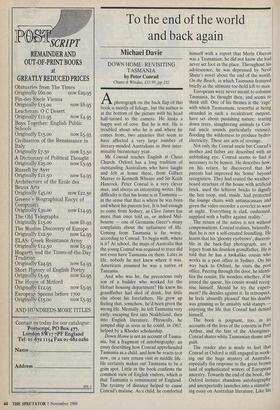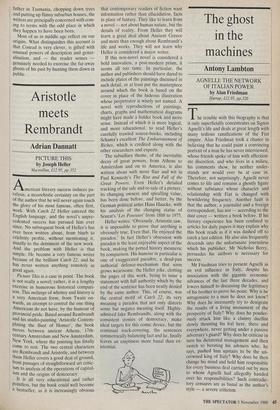To the end of the world and back again
Michael Davie
DOWN HOME: REVISITING TASMANIA by Peter Conrad
Chatto & Windus, £12.95, pp.232
Aphotograph on the back flap of this book is mostly of foliage, but the author is at the bottom of the picture with his head half-turned to the camera. He looks a happy sort of cove. But he is not. He is troubled about who he is and where he comes from, two anxieties that seem to have affected a very large number of literary-minded Australians in their inter- minable bicentenary year.
Mr Conrad teaches English at Christ Church. Oxford has a long tradition of outstanding Australians who have taught and felt at home there, from Gilbert Murray to Kenneth Wheare and Sir Keith Hancock. Peter Conrad is a very clever man, and always an interesting writer, His difficulty is that his hOme is in Tasmania- in the sense that that is where he was born and where his parents live. It is bad enough to come from Sydney, as Clive James has more than once told us, or indeed Mel- bourne - one of Germaine Greer's many complaints about the unfairness of life. Coming from Tasmania is far worse, according to Conrad. To begin with, where is it? At school, the maps of Australia that the young Conrad was required to trace did not even have Tasmania on them. Later in life, nobody he met knew where it was. Americans assumed he was a native of Tanzania.
And who was he, the precocious only son of a builder who worked for the Hobart housing department? He knew his grandfather had died of drink, but little else about his forefathers. He grew up feeling that, somehow, he'd been given the wrong life. Mentally, he left Tasmania very early, escaping first into Noddyland, then into English literature. Physically, he jumped ship as soon as he could, in 1967, helped by a Rhodes scholarship.
Down Home is not an account of Tasma- nia, but a fragment of autobiography: an essay describing how Conrad apprehended Tasmania as a child, and how he reacts to it now, on a rare return visit in middle life. He certainly makes out Tasmania to be a grim spot. Little in the book confirms the common view of English visitors, which is that Tasmania is reminiscent of England. The tyranny of distance helped to cause Conrad's malaise. As a child, he comforted himself with a report that Merle Oberon was a Tasmanian; he did not know she had never set foot in the place. Throughout his adolescence, he was depressed by Neyil Shute's novel about the end of the world, On the Beach, in which Tasmania featured briefly as the ultimate toe-hold left to man.
Europeans were never meant to colonise Tasmania, he thought then, and seems to think still. One of his themes is the 'rage' with which Tasmanians, resentful at being stranded in such a recalcitrant outpost, have set about punishing nature: tearing down trees, slaughtering animals (a Con- rad uncle sounds particularly vicious), flooding the wilderness to produce hydro- electricity. These are acts of revenge.
Not only the Conrad uncle but Conrad's mother and father are described with an unblinking eye. Conrad seems to find it necessary to be honest. He describes how, on his return, he discovered that his parents had improved his 'home' beyond recognition. They had coated the weather- board structure of the house with artificial brick, used the leftover bricks to dignify the hen coop, and, inside, had protected the lounge chairs with antimacassars and given the video recorder a coverlet to wear at night. 'Everything is clad, cushioned, supplied with a buffer against reality.'
The return of the native is not without compensations. Conrad realises, belatedly, that he is not a self-created foundling. He learns that his 'gloomy eyebrows', discerni- ble in the back-flap photograph, are a legacy from his drunken grandfather. He is told that he has a lookalike cousin who works in a post office in Sydney. On his way back to Oxford, he visits the post office. Peering through the door, he identi- fies the cousin. He wonders whether, if he joined the queue, his cousin would recog- nise himself. Should he try the experi- ment? He decides against it. In retrospect, he feels 'absurdly pleased' that his double was grinning as he amiably sold stamps - enjoying the life that Conrad had denied himself.
The book is poignant, too, in its accounts of the lives of the convicts in Port Arthur, and the fate of the Aborigines. Conrad shares white Tasmanian shame and guilt.
The reader also is made to . feel that Conrad in Oxford is still engaged in work- ing out the huge mystery of Australia, especially the response to the great brown land of sophisticated writers of European ancestry. Towards the end of the book, the Oxford lecturer abandons autobiography and unexpectedly launches into a stimulat- ing essay on Australian literature. Like his
father in Tasmania, chopping down trees and putting up flimsy suburban houses, the writers are principally concerned with com- ing to terms with the odd place in which they happen to have been born.
Most of us in middle age reflect on our origins. What distinguishes this account is that. Conrad is very clever, is gifted with unusual powers of description and gener- alisation, and — the reader senses genuinely needed to exorcise the far-away ghosts of his past by hunting them down in public.



































































 Previous page
Previous page